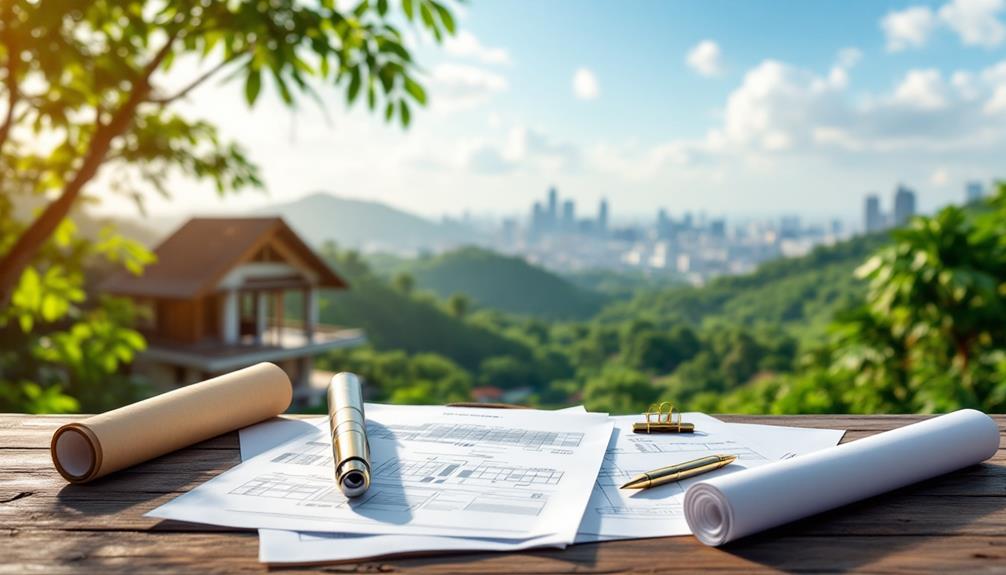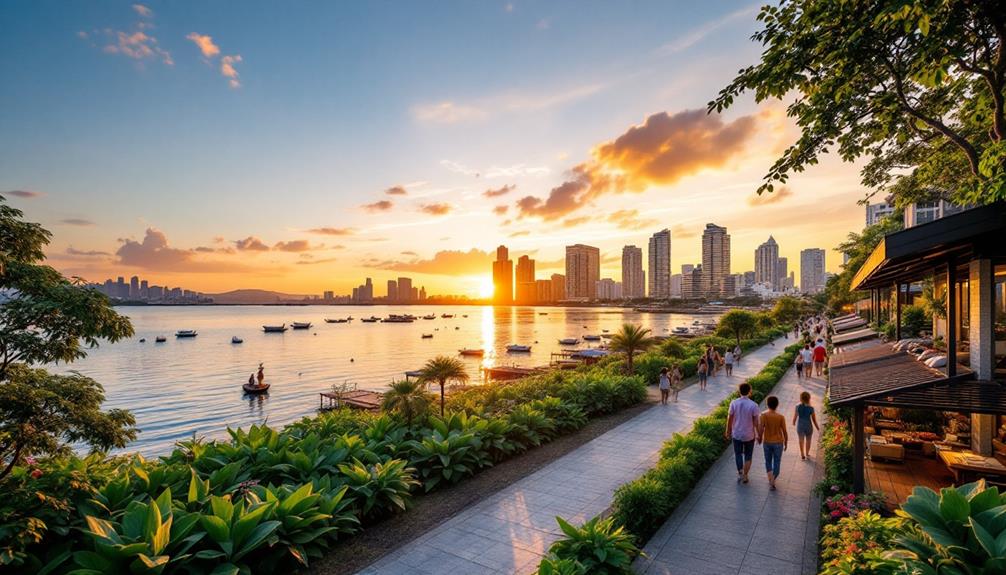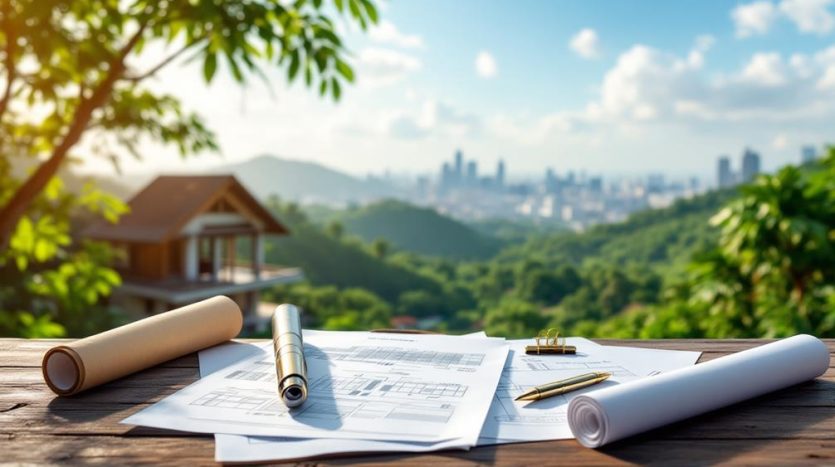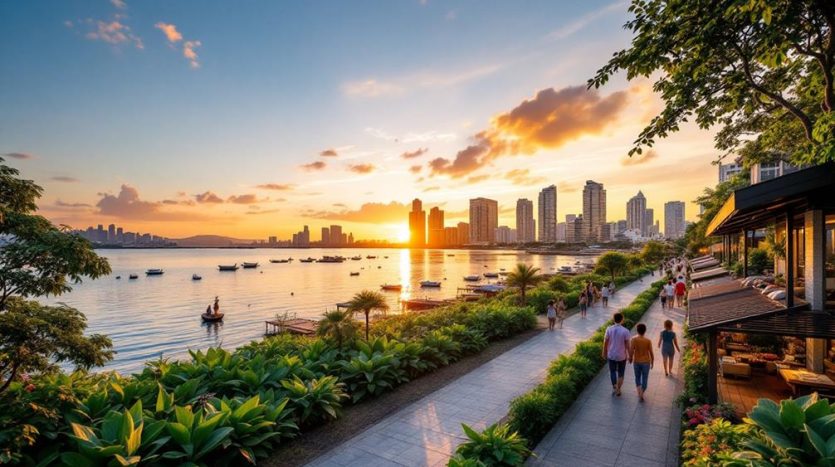Is It Worth Buying Property in Thailand?
When considering the allure of Thailand's white sandy beaches against the legal complexities of property ownership, you might wonder if the investment is worth it. The country's real estate market has shown promising growth, with appealing rental yields in bustling cities like Bangkok and Phuket. Yet, the maze of regulations for foreign buyers can seem overwhelming. So, how do you navigate these challenges without losing sight of the potential rewards? Understanding the balance between opportunity and risk is key, and diving into these aspects could be the first step toward a sound decision.
Key Takeaways
- Thailand's property market shows steady growth, with annual property price increases of around 5%.
- High rental demand, especially in tourist-heavy areas like Bangkok and Phuket, offers lucrative investment opportunities.
- Legal frameworks allow foreign ownership of condominiums and leasehold agreements for land, with legal advice recommended.
- Thai banks and developers provide financing options, though foreigners face higher interest rates and down payment requirements.
- Economic growth and infrastructure projects boost future property value, enhancing investment potential.
Benefits of Thai Property Investment

Investing in Thai property offers several compelling advantages that are grounded in data and market trends. If you're all about smart investment strategies, Thailand's got your back.
The country's property market has shown resilience, with a steady growth trajectory that would make even the most skeptical investor raise an eyebrow—or two. The vibrant tourism industry pumps up the rental demand like a bodybuilder before a competition, ensuring your property doesn't gather dust. And let's face it, nobody wants dusty investments.
Additionally, regional price variations highlight diverse investment opportunities across the country, from the bustling city life of Bangkok to the more serene and affordable rural properties.
When it comes to property management, Thailand provides you with a buffet of options. From luxurious beachfront condos to bustling city apartments, you can tailor your investment strategy like a bespoke suit.
Data shows that rental yields in hotspots like Bangkok and Phuket can exceed 5%, a number that would make your calculator blush.
Besides, managing properties here isn't rocket science. With a plethora of property management firms ready to cater to your every whim, you can focus on the finer things in life—like planning your next investment move or perfecting your pad Thai recipe.
Legal Framework for Foreign Buyers
Steering through the legal framework for foreign buyers in Thailand is essential for a successful property investment. You might dream of owning a slice of paradise, but maneuvering the maze of property ownership and foreign regulations requires a strategic approach. In Thailand, foreigners can own buildings but not land. This means you can purchase a condo, provided foreign ownership in that building doesn't exceed 49%.
To make things a bit clearer, here's a handy table:
| Key Aspect | Details |
|---|---|
| Land Ownership | Not permitted for foreigners |
| Condominium Ownership | Up to 49% of the building |
| Leasehold Agreements | Up to 30 years, with potential renewals |
| Company Ownership | Foreigners can own up to 49% of a company |
Leasehold agreements might become your best friend, offering long-term use of land for up to 30 years, with optional renewals. Alternatively, you can set up a Thai company, where you hold up to 49% shares, though this option's more complex and requires careful legal advice—because nobody wants a surprise plot twist in their property saga.
Popular Locations for Investment

When considering property investment in Thailand, you should focus on Bangkok and Phuket due to their distinct opportunities.
Bangkok offers a robust real estate market with a 5% annual growth rate, driven by urban expansion and infrastructure development.
Additionally, Bangkok's diverse rental market, including short-term rentals and serviced apartments, caters to various lifestyles and investment strategies.
Meanwhile, Phuket presents a high rental yield potential, averaging 7%, propelled by its thriving tourism sector.
Bangkok Real Estate Opportunities
With its vibrant economy and rich cultural landscape, Bangkok presents a wealth of real estate investment opportunities for discerning buyers. In this bustling metropolis, Bangkok neighborhoods offer diverse property types, each with its own charm and investment potential.
For instance, Sukhumvit is a favorite among expats, known for luxury condos and its proximity to international schools. Meanwhile, Silom and Sathorn serve as financial hubs, where commercial properties and upscale apartments cater to professionals who love the excitement of city life and the thrill of paying for it.
Data suggests that Bangkok's property market has seen steady growth, with a 5% annual increase in demand over recent years. If you're considering investing, areas like Thonglor and Ekkamai are popular for their trendy appeal and growing expat communities.
These neighborhoods boast modern condos and townhouses, offering a balance between urban living and suburban tranquility.
For those who fancy a bit of history with their investment, Old Town Bangkok offers charming, albeit less modern, options.
Phuket Investment Potential
Diving into Phuket's real estate market reveals promising investment opportunities in this tropical paradise. Known for its booming Phuket tourism, the island offers robust property appreciation rates, making it a hotspot for savvy investors. Before you envision yourself sipping cocktails by the pool of your newly acquired villa, consider these data-driven insights.
- Luxury developments: The rise in high-end projects caters to both the affluent expatriate community and tourists seeking upscale experiences.
- Rental demand: With tourism figures showing no signs of decline, short-term rental properties can yield impressive returns.
- Local economy: Phuket's economy thrives on tourism, but don't worry, it's not a one-trick pony. The island's infrastructure improvements bolster long-term growth prospects.
- Cultural factors: A rich tapestry of Thai culture enhances the island's appeal, attracting a diverse buyer base.
Phuket's lifestyle benefits can't be ignored—imagine swapping congested city streets for serene beaches.
Regarding market comparison, Phuket offers competitive advantages over other Asian hotspots, balancing investment strategies with leisure.
While property prices soar like the island's famous kites, your investment could join them if navigated wisely.
Understanding Property Types
Steering through the diverse real estate market in Thailand requires a solid understanding of the various property types available. You'll encounter everything from beachfront condos to sprawling villas, each with its own quirks and investment strategies. Let's break it down like a game of Monopoly, but with sunnier properties and less sibling rivalry.
Here's a quick look at the main types:
| Property Type | Pros | Cons |
|---|---|---|
| Condominiums | Easy to rent and maintain | Foreign ownership limits |
| Villas | High rental yields | High maintenance costs |
| Townhouses | Affordable entry point | Limited appreciation potential |
Condos are the go-to for foreign buyers due to their ease of purchase and maintenance, but watch out for those pesky ownership limits. Villas scream luxury and come with high rental yields, though they can also scream high maintenance bills. Townhouses offer an affordable entry, yet may not appreciate as fast as you'd like.
Analyzing these property types will help you tailor your investment strategies. Want steady rental income? Condos might be your jam. Dreaming of a vacation home that pays for itself? Villas could be the ticket. In any case, understanding these property types guarantees you're not just throwing baht into the wind.
Navigating the Buying Process

Beginning the journey to buy property in Thailand requires a structured approach to the buying process, guaranteeing a seamless experience. First, you'll want to enlist a buyer's agent. These professionals can help you navigate the market, offering insights that might be as elusive as a Thai sunset on a cloudy day.
Local markets and affordable housing options make Thailand an attractive destination for potential buyers. Property valuation is your next significant step. You don't want to overpay for a beachfront view that's more "sand-trap" than "paradise." An accurate valuation guarantees you're paying what the property's worth—no more, no less.
Here's your game plan for a successful purchase:
- Hire a qualified buyer's agent: They're your compass in the sometimes bewildering Thai real estate market.
- Get a property valuation: Don't rely on gut feelings—numbers don't lie.
- Conduct due diligence: Check for legal issues, because surprises are only fun at birthday parties.
- Negotiate the price: Channel your inner haggler; this isn't the time for conflict avoidance.
Financing Options Available
When considering financing options for purchasing property in Thailand, it's essential to understand both local and international avenues that can accommodate your investment goals.
Let's explore the world of mortgage options and financing strategies with the precision of a scalpel-wielding surgeon and the humor of a stand-up comedian on a caffeine high.
Locally, Thai banks offer mortgage options to foreigners, but—with the enthusiasm of a sloth on a Monday morning—they might require significant documentation, including work permits or proof of income.
Interest rates typically hover between 5% and 7%. You'll need a solid down payment, often 30% or more, to secure a loan.
Developer financing can also be an attractive option, providing alternatives to traditional bank loans with more flexible terms and incentives like lower down payments and extended payment plans.
But hey, who doesn't love a good financial challenge?
Internationally, your existing home country bank might extend their services to Thailand. This can simplify the process, but it may come with higher interest rates—because banks love suspense as much as you love a good plot twist.
Alternatively, consider financing strategies like developer financing, often available for new builds.
These can offer more flexible terms and lower initial costs, much like a yoga instructor offering you a free trial class with unlimited downward dogs.
Market Trends and Insights

When examining the current market in Thailand, you'll find a stable demand for properties, particularly in tourist-heavy areas like Phuket and Bangkok, supported by a 5% annual increase in property prices.
Analysts predict a positive future growth potential driven by infrastructure projects and government initiatives aimed at boosting foreign investment.
Staying informed on these trends will help you make data-driven decisions in this dynamic market.
Current Market Analysis
Thailand's property market is currently experiencing a dynamic phase, characterized by both opportunities and challenges. The market dynamics are as lively as Bangkok's street food scene—full of surprises and flavors. Buyer sentiment is a mix of cautious optimism and underlying anxiety, somewhat like trying durian for the first time. But what's really happening on the ground?
- Supply and Demand: The market's got more condos than a cat's got lives, yet demand is steadily rising, especially in urban areas.
- Foreign Investment: Restrictions on foreign ownership add a layer of complexity, but international interest remains strong.
- Interest Rates: Low interest rates are like a double-edged sword—they make borrowing cheaper but can inflate property prices.
- Regulatory Changes: Government policies fluctuate more than a tuk-tuk fare, affecting property taxes and development regulations.
With these factors in mind, the property market in Thailand is a bit of a rollercoaster. You mightn't scream with excitement, but you'll definitely feel the thrill of maneuvering its twists and turns.
Whether you're eyeing a Bangkok condo or a Phuket villa, understanding these dynamics will help you decide if it's worth taking the plunge. Just remember, fortune favors the brave—and informed.
Future Growth Potential
As the current market dynamics unfold, the focus shifts to the future growth potential in Thailand's property sector. You might be wondering if you've missed the boat or if there's still a chance to ride the wave of investment glory.
Fear not, as the data suggests promising trends for the property market. Thailand's GDP growth is projected to hover around 3-5% annually, which bodes well for real estate. Urbanization and the influx of foreign investors have been driving demand, especially in hotspots like Bangkok and Phuket.
Now, let's talk investment strategies. Diversifying your portfolio to include both residential and commercial properties could be a smart move. The Thai government has been rolling out infrastructure projects like the Eastern Economic Corridor, which is expected to boost property values.
Imagine your future self sipping a coconut by the beach, knowing your investment is growing faster than a tourist's sunburn.
But remember, every rose has its thorn. Keep an eye on legal regulations and market fluctuations.
Rental Yields and Returns
Investors seeking robust returns often analyze rental yields, the essential metric that measures income-generating potential from property investments.
In Thailand, rental yields can be a mixed bag, much like your aunt's holiday fruitcake. Understanding rental demand is important for formulating sound investment strategies. So, let's break it down.
– Rental Demand: Thailand's tourism boom means high short-term rental demand, especially in hotspots like Bangkok and Phuket.
But remember, your tenants may only want a short-term fling, not a long-term commitment.
– Location, Location, Location: Properties in prime areas typically offer higher yields.
However, they also come with a heftier price tag. It's a bit like buying organic kale—great returns, but you'll pay for the privilege.
– Property Type: Condos often yield better than single-family homes.
They're like the Swiss Army knife of investments—compact and versatile with multiple uses.
– Market Trends: Keep an eye on local economic indicators.
A thriving economy boosts rental markets, while downturns might leave you in a pickle, searching for tenants like a game of hide-and-seek.
Taxation and Fees Explained

When buying property in Thailand, understanding the tax landscape is essential for making informed investment decisions. Steering through property taxes and transaction fees may not be as thrilling as a tuk-tuk ride through Bangkok, but it'll save you from unexpected costs. Let's break it down:
| Fee/Tax | Description | Rate (%) |
|---|---|---|
| Transfer Fee | Paid upon property transfer | 2.0 |
| Withholding Tax | Applied only if seller is a company | 1.0 or 3.0 |
| Specific Business Tax | If property sold within 5 years | 3.3 |
| Stamp Duty | Applies if Specific Business Tax is exempt | 0.5 |
| Income Tax (Progressive) | Based on assessed property value | 0-35 |
The transfer fee is your first date with Thailand's tax system—a flat 2%. If you're selling, withholding tax is your next dance partner, typically 1% of the appraised value. Specific Business Tax (3.3%) pops up like a surprise relative if you sell within five years. Stamp Duty, the less intrusive cousin, only shows if the Business Tax doesn't apply. Ultimately, progressive income tax is like a buffet, offering rates from 0% to 35%, depending on how hefty your property value is. With these insights, you can now tackle Thailand's property taxes and transaction fees like a pro—one who reads fine print with a smile.
Risks and Challenges to Consider
Maneuvering the property market in Thailand involves understanding numerous risks and challenges that could impact your investment. Economic instability can cause fluctuations in property values, while the ever-changing exchange rate might make your Thai baht feel more like Monopoly money.
Cultural differences can also play a role, as property laws may seem like they were written in a parallel universe. Not to mention, market saturation can lead to fierce competition, leaving you scrambling for a slice of the real estate pie.
Be on the lookout for:
- Legal disputes: Steering through Thailand's legal system can feel like a never-ending episode of a courtroom drama.
- Property maintenance: Thai properties might require more upkeep than your 20-year-old car.
- Political climate: Changes in government can affect property regulations faster than you can say "Pad Thai."
- Investment scams: Some deals can be as sketchy as a hand-drawn map to your new beachfront condo.
Infrastructure development and environmental concerns can also affect property values. Poor planning and sudden floods might leave you in deep water—literally.
Keep an analytical eye on these factors, and you might just dodge the pitfalls of investing in Thailand's property market.
Tips for First-Time Buyers

When buying property in Thailand, it's essential to understand the legal requirements, such as foreign ownership restrictions and necessary permits, which can greatly impact your purchasing decision.
Data from property market analyses suggest that choosing an ideal location, like Bangkok or Phuket, can potentially yield higher returns on investment due to their robust tourism and economic activities.
Understanding Legal Requirements
Steering through Thailand's property market requires a clear understanding of the legal requirements, especially for first-time buyers.
After all, you wouldn't want to end up with a lovely beachside shack that's actually owned by someone else, right? Charting the maze of property ownership and legal documentation can be intimidating, but fear not—it's manageable with a bit of due diligence.
First, knowing that foreigners can only own 49% of a condominium building is essential. This means you're better off avoiding those dreams of a standalone Thai mansion.
Also, you'll need to guarantee that all legal documentation is in order before signing anything that might resemble a contract.
Here's a quick checklist to keep you on track:
- Title Deeds: Verify that the seller truly owns the property.
- Land Usage: Understand zoning laws—your dream home can't be a pizza parlor.
- Taxes and Fees: Be prepared for transfer fees and taxes, about 6-7% of the property's value.
- Legal Advice: Consider hiring a lawyer specializing in Thai property law.
While legal requirements can seem like a puzzle, they're not impossible to solve.
Just remember: a bit of legal foresight beats a lifetime of property blunders.
Choosing Ideal Locations
Once you've navigated the legal framework, the next step is selecting the right location for your property investment in Thailand.
Let's cut to the chase: picking the perfect spot can feel like finding a needle in a haystack, except this haystack has beaches and street food.
Begin by considering property hotspots like Bangkok, Phuket, and Chiang Mai. These urban centers are akin to New York with a side of pad thai—bustling, vibrant, and full of potential for both residential and rental properties.
Now, if you're more into the sound of chirping crickets than honking cars, the rural areas might be your cup of Thai tea.
Think Isan or parts of the North, where property can be a bargain. But remember, rural charm comes with fewer amenities and, let's be honest, a longer commute to your favorite noodle shop.
When choosing urban vs rural, weigh factors like market trends, potential returns, and your lifestyle preferences.
Data shows urban areas generally offer higher returns but come with steeper prices. However, rural properties can be a goldmine if you don't mind trading Wi-Fi speed for tranquility.
It's your move—choose wisely!
Future Prospects of Thai Realty
In examining the future prospects of Thai realty, it's essential to evaluate the country's economic growth trajectory and urbanization trends. Thailand, as an emerging market, offers potential for sustainable development, which could tickle your interest in real estate like a feather in a tickle fight.
The economy has been showing signs of recovery and growth, with GDP projections indicating positive momentum. But let's not pop the champagne just yet—there are a few factors to take into account.
- Economic Growth: Thailand's GDP is projected to grow, bolstered by tourism and manufacturing sectors. However, keep an eye on global economic conditions.
- Urbanization Trends: Rapid urbanization is drawing more people to cities, increasing the demand for housing and commercial properties. But hey, who doesn't love a good traffic jam?
- Regulatory Environment: Changes in property laws could impact foreign investments. So, stay informed or risk feeling like you're playing Monopoly without reading the rules.
- Sustainable Development: There's a growing emphasis on eco-friendly projects. Reflect on whether going green aligns with your investment strategy—or just your favorite color.










